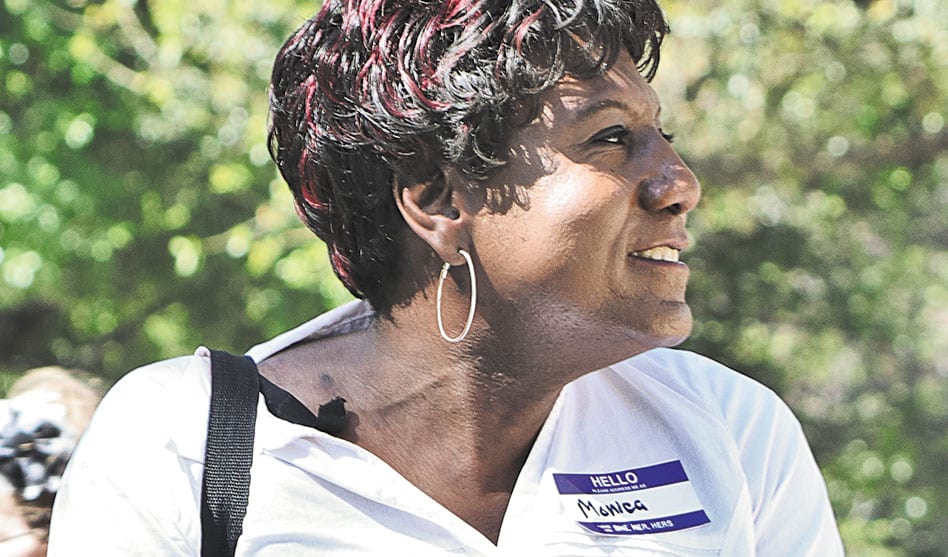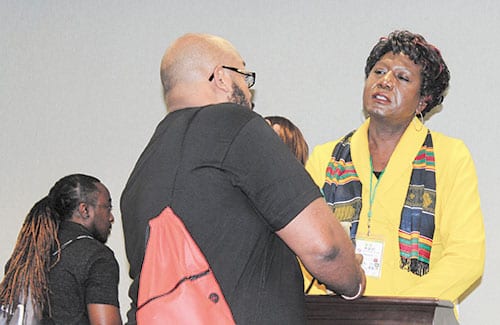
Nationally-known transgender activist Monica Roberts of Houston said this week she expects that the April 12 attack on Dallas transgender woman Muhlaysia Booker will be front and center when the Black Trans Advocacy Conference opens in Dallas on Tuesday, April 23.
But rather than criticizing how authorities here handled the attack, Roberts said, “Dallas is a role model for this.” By that, she meant there was no dead-naming of the victim, no reports referring to Booker as a “man in a dress.”

Monica Roberts, right, at a previous BTAC. (David Taffet/Dallas Voice)
During any investigation, Roberts said, the first 48 hours are the most important. If police are asking for help but they inaccurately describe a victim or a suspect, people won’t know who they’re talking about and won’t be able to help. For instance, if the victim is a trans woman, but police describe her as a man and dead-name her, people who know her might not realize that’s who authorities are talking about.
And, Roberts said, this isn’t the only case in which Dallas police have gotten it right. “In the Karla Pavon case [in 2018], the Dallas PD was on it,” she said.
Dallas police apprehended the suspect in Pavon’s case within a week.
In the case of the assault on Muhlaysia Booker, which was caught on video and has been replayed by media across the country, Roberts complimented everyone from police and media to Booker’s family. The one group she does fault is her own black community.
“The black community has turned a blind eye to black trans violence,” Roberts said. “They think they have carte blanche to beat us up and kill us.”
Roberts said she’d like to see a national or statewide group like the NAACP make a statement on violence against trans people of color: “We need to hear these words: Black trans folks are black folks.”
She also blames the former Lesbian Gay Rights Lobby of Texas, now known as Equality Texas, for allowing the James Byrd Hate Crime Law to pass without including gender identity as a protected category. She said the gay community was using a tactic known as “incremental legislation.” They knew a bill including sexual orientation would pass but believed that including gender identity might cause the bill to fail.
In the Booker case, the FBI is helping Dallas police investigate whether the attack qualifies as a hate crime. The federal hate crimes law does include gender identity, and it includes money to investigate hate crimes.
The Texas hate crime law is a penalty enhancement law. Edward Thomas is charged with aggravated assault causing severe bodily injury in the attack on Booker. If the state can prove he used anti-gay slurs while committing the crime, he may face an enhanced penalty under the Texas law. However, if those slurs were anti-trans, the law might not apply.
Roberts said what offends her most about the Texas hate crime law since it passed in 2001 is that two trans women of color were killed in Texas that year.
Blogging for justice
Roberts writes the award-winning Transgriot blog, which she began in 2006. At the time, no one else was writing about trans people of color. “The blogs that were out there were not talking about the issues of transition from a black perspective,” she said.
So Roberts began writing about and documenting the history of the trans community, especially black trans women. Since she began, she has had a keen eye for identifying those murders where police misgendered and incorrectly identified trans victims.
Then Roberts began tracking what happened to the person who committed the murder, if they were caught. What she found, she said, was that attackers were “getting a slap on the wrist.”
Roberts is usually the first to find reports, even from a media outlet in a city hundreds of miles or more away from Houston, and correctly identify the victim as transgender. Her network of contacts across the country helps her find those misleading reports about a murder victim identified as “a man in a dress,” and when she does, she contacts the reporter on the story.
“If talking to them nicely doesn’t work, I’ll embarrass the reporter,” she said.
Making progress
Roberts compares coverage of the trans community today to coverage of the gay community in the early 1980s. At that time, three out of 10 people knew someone gay. Today most people know someone gay and have seen Will & Grace, she said.
As more and more people transition, Roberts said, the number of people who know someone trans has increased from three out of 10 to five out of 10 in just the last few years. That makes a difference in how people see the trans community.
“Now we’re seeing people get elected,” Roberts said. “A trans person is running for the San Antonio City Council. That’s hugely important to our kids.”
But there is still a long, long way to go. That’s why Roberts is excited about the upcoming BTAC conference. “As the Muhlaysia Booker case shows, we’re under attack,” she said. “Next week, I get to decompress and see my BTAC family.”
The first BTAC conference was held in Dallas in 2012. A local group called Black Transmen formed and, when they staged the conference, they realized there wasn’t a group like this anywhere else in the country. So Black Transmen quickly became a national organization. Black Transwomen followed shortly after, and the conference has grown each year.
Roberts said she was invited the second year to be the first trans-feminine keynote speaker and was asked then to join the board.
She said this is her 21st year as an activist, and she travels more now than when she worked for the airlines. She’s been to the White House five times, and speaking engagements keep her busy traveling across the country.
And, she noted, she’s interested in more than just trans issues.
“As a teacher’s kid, I’m interested in education,” she said. And as a trans woman, women’s issues affect her. “I lost two cousins to HIV.
One out of four black trans folks are dealing with HIV.”
But will she really get to just decompress at the BTAC conference next week?
“I may have to go to Austin to testify sometime during the week,” she acknowledged.
[“source=dallasvoice”]
